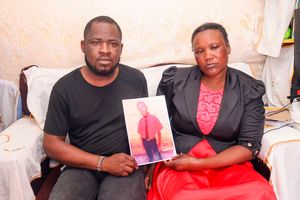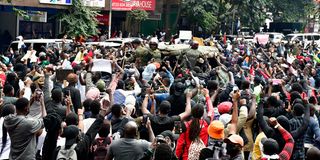
Youthful protestors mob a police vehicle along Kimathi Street in Nairobi during the Anti-Finance Bill protests on June 20, 2024.
The government has partnered with the World Bank to roll out a Sh 20 billion National Youth Opportunity Towards Advancement (NYOTA) project to empower young people — as political parties, leaders, and institutions intensify efforts to court the crucial youth vote ahead of the 2027 elections.
President William Ruto announced that, in recognition of their immense potential, critical role in the economy, and capacity for creativity and innovation, the initiative aims to empower more than 800,000 youth aged 18–29 years and up to 35 years for those with disabilities.
“The empowerment will be achieved by enhancing employability through skills training, on-the-job experience, recognition of prior learning, entrepreneurial development, and the promotion of a savings culture,” the Head of State said during this year’s Madaraka Day celebrations in Homa Bay.
He noted that the initiative targets at least 70 youth per ward across the country, offering grant funding, business training, and market linkages.
“We have committed Sh 5 billion in grants to support 100,000 young people, each receiving Sh 50,000 in seed capital to start their entrepreneurial journey by August this year.”
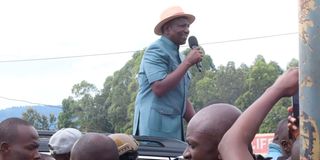
President William Ruto addresses residents of Rongo in Migori County on May 5, 2025.
In a move seen as aimed at courting the critical Gen Z vote bloc, President Ruto also announced that effective this week, the government will commence the nationwide rollout of Climate Worx, “a bold and ambitious initiative aimed at engaging over 110,000 young people across all 47 counties in meaningful work that strengthens our nation’s resilience, beginning with informal settlements.”
Launched last year in Nairobi, the programme, he said, has recorded significant success and is now being expanded to the remaining 46 counties.
Structured as a social protection programme, Climate Worx will engage youth to deliver vital public goods, including the construction of roads, the planting of trees, and the improvement of environmental sanitation within their localities, mirroring former president Uhuru Kenyatta’s Kazi Mtaani program.
As Kenya inches closer to the 2027 General Election, Gen Z, a powerful and largely untapped political force, is commanding attention across the political divide.
Born between the late 1990s and 2010, this cohort of young Kenyans is emerging not just as a voting bloc, but as a cultural and political movement.
Political parties, leaders, and institutions are scrambling to appeal to their aspirations, anxieties, and activism.
ODM leader has also renewed his push for the government to compensate victims of police brutality during June 2024 anti-tax demonstrations by the youth, espousing how leaders are keen to appease the younger generation.
“Mr President, I heard your apology to the youth, and that of the speaker; it was a commendable first step towards reconciliation. But we must go further. Families who lost their kin and those who were maimed deserve compensation. Only then can we truly turn this painful page of our national history,” Mr Odinga said.
According to the 2019 Kenya National Bureau of Statistics (KNBS) census, Kenya is a youthful nation with over 75 percent of its 47.6 million people under the age of 35.
The youth population aged between 18 and 34 stood at 13.7 million — roughly 29 percent of the national population.
Yet despite these figures, youth voter registration remains worryingly low. The Independent Electoral and Boundaries Commission (IEBC) noted that in the 2022 General Election, youth aged 18–35 accounted for only 39.8 percent of registered voters, a sharp decline from 2017.
With millions of young Kenyans unregistered to vote, political leaders are now urging them to rise and shape the country's future.
“There are more than nine million young Kenyans who are not registered as voters. Some of them don't even have National Identity Cards,” said Wiper leader Kalonzo Musyoka when he hosted opposition leaders at his Muuna home, Tseikuru in Mwingi, Kitui County on Thursday.
“We must make this a priority to ensure prospective voters are not left out.”
The meeting also brought together Gen Z activists, in a move aimed at securing their support.
“First, tell the country who killed the Gen Zs before asking for forgiveness,” the former Vice President challenged President William Ruto, who just a day earlier, during the National Prayer Breakfast, sought forgiveness from the young Kenyans following a massive State crackdown during anti-tax protests last year.
This move further illustrated how strategic the youth vote is to the political class.
Turning to Kenya’s Gen Zs, President Ruto acknowledged the frustrations they have voiced over the past year, particularly in the wake of controversial government decisions and strained public discourse.
“To our children, if there has been any misstep on our part, we apologise. We want to build a relationship with you that will make our country great and move us forward,” he said at the 22nd National Prayer Breakfast.
But at the solemn gathering at Safari Park Hotel in Nairobi on Wednesday, the Head of State moved to quell rising tensions, signalling a shift towards humility and healing in leadership.
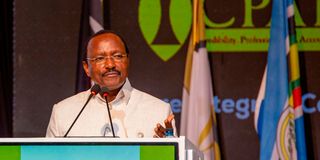
Wiper Party Leader Kalonzo Musyoka, while addressing accountants on the last day of the 42nd Annual ICPAK Seminar at Sarova Whitesands in Mombasa on May 23, 2025.
But Mr Musyoka charged: “The truth must be put in the open for justice to be done before any reconciliation.”
Former Deputy President Rigathi Gachagua, who is one of the opposition chiefs who has heightened massive pushbacks against the Kenya Kwanza administration, echoed the need to empower young voters.
Mr Gachagua has emphasised the importance of integrating young Kenyans into leadership.
“I want to say that an administration that I will lead will have experienced people backed by fresh young people with new ideas and energy,” said Mr Gachagua. “I have surrounded myself with youthful people so I can benefit from their energy, perspective, and wide knowledge.”
He listed several youthful appointments in his party: Sarah Owino, 24, from Kisumu, as Deputy Chair in charge of operations; Miriam Fredina Mariki, 26, from Taita Taveta, as Deputy Organising Secretary in charge of strategy; and Alvina Kabura, 31, from Murang’a, as Secretary for International Affairs.
Others he mentioned are: Alvina Kabura from Murang’a, 31, who is the Secretary for International Affairs, Cera Wanjiku (national youth leader, 33), and Breda Bajira from Busia, a 34-year-old serving as the Executive Director.
“With this group of buzzing energy, you can’t go wrong,” he said.
The Raila Odinga-led Orange Democratic Movement (ODM) is also recalibrating its youth strategy.
The party has since rolled out Gen Z-targeted initiatives across the country, with youthful activist Kasmuel McOure, famed for leading the Gen Z protests last year, leading one wing to woo the young voters.

Kasmuel McOure speaks at Bukiri Primary School, Funyula, Busia County, on February 28, 2025, as the Orange Democratic Movement celebrated 20 years in Kenya's political landscape.
ODM Secretary-General Edwin Sifuna revealed that the party is restructuring its youth wing and embracing technology to attract Gen Z voters.
“We are empowering our vibrant youth wing and leveraging on changing technology and media to make our party an appealing institution for the youth,” said Mr Sifuna.
“We’re also positioning youth in influential places, as evidenced by our nominations.”
Mr McOure, who presided over a youth initiative in Mathare Constituency on May 26, said he was keen to tap into the youth support to back the Odinga-led Orange party.
“I had a powerful engagement with ODM Youth League members in Mathare, where we deliberated on issues affecting the youth in our Party and our role in shaping Kenya’s politics. We also reaffirmed our commitment to defend the spirit of our party and strengthen our grassroots network,” he said.
He went on to criticise Mr Gachagua, “I’m here to tell you that Rigathi Gachagua is not an option, even if you call me a government project. I have told you I’m a project of Raila Odinga and ODM, but Rigathi is not an option for this country.”
The youth vote appears to have excited everyone in the political space over its potentially huge vote.
Even former President Uhuru Kenyatta, who during his tenure warned of a looming “youth bulge,” has called on the young generation to stand up for their rights.
“Young people must not sit around and watch their future being stolen. They must stand up and demand what is rightfully theirs,” he said at a recent event.
Youthful National Liberal Party (NLP) Secretary General Omondi K’Oyoo says, “Reality has finally dawned on the two major political factions that the Gen Z and millennials hold the ultimate say on who will be president in 2027.”
“The president’s apology came in too little, too late. The young people en masse have suddenly grown politically conscious and are determined to unsettle the old political order in the next elections.”
Mr K’Oyoo, however, warns that “The only undoing within the young people’s vote basket is lack of a structured political umbrella for organising, mobilising and actualising the change to take power.”
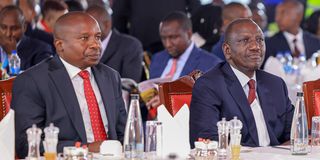
President William Ruto with his deputy, Professor Kithure Kindiki at the National Prayer Breakfast at Safari Park.
Deputy President Prof Kithure Kindiki has emphasised the need to build good relationships across generations.
“The intergenerational friendship between old and young is important. No one generation is superior or more important than the other. We need to treat our children more respectfully, listen to them and where we go wrong, we acknowledge and do better. However, we respectfully request our children to also respect authority and elders and agree to be mentored and supported,” the DP said during the Wednesday National Prayer Breakfast in Nairobi, where the Head of State seized the opportunity to tender his apology to the youth.
But in a purported, undated statement by Gen Z on Friday, they declined to join the ruling class, noting that “respect is earned.”
The IEBC, for its part, is also attempting to rebuild trust with the youth after being accused of sidelining them.
In April, the electoral body met with the Interparty Youth Forum to discuss strengthening youth participation in electoral processes.
Chrisphine Owiye, Director of Legal Services at IEBC, reaffirmed the constitutional obligation under Article 55 to promote youth political participation.
“Youth representation is a mandatory component in political party structures. We must implement affirmative action to guarantee youth access to political participation opportunities,” he said.
Still, barriers remain. Many young voters face logistical challenges in accessing registration centres and polling stations. Others cite a lack of trust in the electoral system, high unemployment, and political disillusionment as reasons for staying away from the ballot.
A 2022 report by the African Union and COMESA noted that youth participation in elections was hindered by “a general conception that votes do not count,” along with economic disenfranchisement and political exclusion.
Despite the hurdles, Kenya’s Constitution provides multiple avenues for youth inclusion — from proportional representation in Parliament and Senate to designated slots in county assemblies and political parties. The Political Parties (Amendment) Act, 2022, now compels parties to allocate at least 15 percent of leadership positions to people under 35.
Mr Odinga has also aligned his recent Memorandum of Understanding with the ruling United Democratic Alliance (UDA) to include youth-centred proposals — from economic investment in young people to full implementation of the National Dialogue Committee (NADCO) report, which calls for inclusivity in budgeting and public appointments.
“The future of this country will be determined by the willingness of leaders to trust our young people and give them an opportunity to lead,” asserted Mr Gachagua.

Shakira Wafula, a prominent figure in the June 2024 Gen Z protests, shared her experience of being at the forefront of the nationwide movement against the Finance Bill 2024.
As the 2027 elections draw near, it is clear that Gen Z is no longer a silent demographic.
For Kenya’s political leaders, ignoring them may no longer be an option. The race is on to win their hearts, minds, and most crucially — their votes.
With voter registration drives expected to ramp up, this group could tilt the scales in any tightly contested election.
Political parties are already adjusting their messaging.
Manifestos are being rewritten to reflect digital innovation, unemployment, and social justice — the issues that matter most to Gen Z.
Analysts say the 2027 campaign trail may look more like a tech startup pitch than a village rally.

